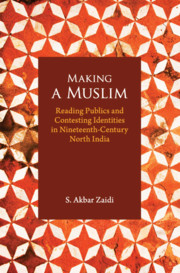Conclusion
Published online by Cambridge University Press: 24 March 2021
Summary
Emerging from a place and condition of zillat (zillat kī hālat, zillat kā maqām), using the changed material and subjective conditions facing them as an agentive force rather than one steeped simply in grief, lamentation and nostalgia, using Urdu and the public places afforded by print, without blaming anyone except themselves (ham khud), writing because they were compelled by their own enterprise—main majbūr hu‘ā—constructing myths and reputations as well as denying authorship, such was the rich terrain of the second half of the nineteenth century in colonial Hindustan from which multiple, conflicting and contradictory ways of becoming, making, being and being made Muslim emerged. South Asian Islam and its Muslims became, in many critical ways, unrecognisable as new forms of being Muslim emerged after the 1860s. One could certainly look back to show continuities with the past, finding key markers and points of inflexion from the late eighteenth and early nineteenth centuries through which pasts found continuity in new forms. Yet Muslims in the late nineteenth century also broke markedly with the past. Through their interaction with colonial modernity—even for those who preferred to avoid it and disengage—and through a realisation of their selves, what they were and what they had become (ham kyā the, kyā ho gā‘e) many new Muslim identities emerged.
Through my arguments here, I have attempted to revise, de-emphasise and challenge established notions about north Indian Muslims that have formed the dominant narrative in scholarship on issues related to community, identity formation, separatism and the nature of pan-Islamism in the second half of the nineteenth century. By de-emphasising both the colonial archive and its particular narrative, as well as the familiar voices of the dominant narrative—both in terms of great men and in terms of dominant institutions—I have repositioned counter-narratives relating to perceptions of the self and community amongst Muslims in north India in the second half of the nineteenth century. Using varied and diverse voices, I show that previous understandings of the condition of north Indian Muslims may have been based on inadequate foundations, constructed primarily on the basis of well-known individuals and key institutions.
- Type
- Chapter
- Information
- Making a MuslimReading Publics and Contesting Identities in Nineteenth-Century North India, pp. 209 - 214Publisher: Cambridge University PressPrint publication year: 2021



